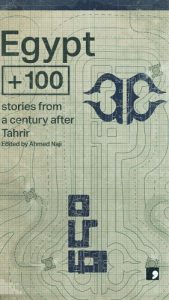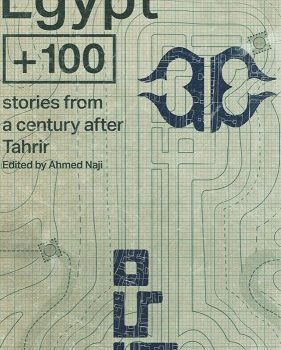Egypt + 100 edited by Ahmed Naji : Review by Niall Harrison
 Egypt + 100, Ahmed Naji ed. (Comma Press 9781912697700, 160pp, £9.99, tp) July 2024.
Egypt + 100, Ahmed Naji ed. (Comma Press 9781912697700, 160pp, £9.99, tp) July 2024.
From the point of view of a science fiction reviewer, Egypt + 100 marks an interesting development in Comma Press’s “Futures Past” series of SWANA-focused anthologies: it is the first in the series to emerge from an active and substantial science fiction tradition. In the introduction to Iraq + 100, Hassan Blassim lamented the “dire shortage of science fiction writing” among Iraqi writers; in Palestine + 100, Basma Ghalayini suggested that science fiction may have been seen as “a luxury, to which Palestinians haven’t felt they can afford to escape”; and Mustafa Gündoğdu and Orsola Casagrande, the editors of Kurdistan + 100, did not talk about science fiction qua science fiction at all, and instead focused (perfectly reasonably) on the political power of “imagining a future.” But now here is Ahmed Naji with Egypt + 100, another strong entry in the series, and he opens with a classic gambit, proposing four possible definitions of science fiction for readerly consideration. Is SF the literature of extrapolation? Of alterity? Of technoculture? Or simply the Global North term for “a canon of dramatic themes and literary plots” that are in fact explored worldwide?
Like any good editor, Naji resists definitively nailing his colours to the mast, instead zeroing in on the definition he brought to this specific project, “a political extrapolation of that moment in time, more than a scientific one” – the moment, in this case, being the 2011 protests in Tahrir Square that led to the removal of Hosni Mubarak from power. And he embeds the work in the anthology within three additional important contexts. First, he provides a useful brief history of Egyptian science fiction over the last century; second, he speculates about how different cultural perceptions of time may help to explain differing traditions of SF; and third, he observes that Egyptian SF writers’ local iteration of “the world is science fictional now” is the frequent improbable or outright ridiculous projects announced by their leaders, whether that’s the Saudi Arabian plan to build the linear city of Neom, or the Egyptian military’s 2014 claim to have invented a device capable of miraculously curing AIDS and hepatitis.
A terrifying end of this tendency towards grandiosity is on display in the opening story, Mansoura Ez-Eldin’s “The Wilderness Facilities” (translated by Paul Starkey). A cool clinical voice sketches an immense conurbation – the colossal structures of which are designed to and largely have shaped its citizens into isolationist conformity – and remorselessly unravels what happens after a nameless woman decides, against all convention, to go shopping in person, and is subsequently murdered in her bed. The system is a true dystopia, which means it works; means that the city wins. According to the official charged with explaining the murder, this is good. “All across the world today,” he reflects, “progress jostles and juxtaposes with barbarism, the future with the distant past.” In other words, if the future is progress and progress is good, then the future must be good, too, even if it looks like this. He might have an interesting conversation with the protagonist of Ahmed El-Fakharany’s “Everything is Great in Rome” (translated by Robin Moger), a gladiator in a new colosseum built on the site of Tahrir Square, who finds himself touring the palace of the vanished president, a place filled with things that “should only exist in the future or science fiction,” yet a place that makes him feel that “every step took him deeper and deeper into a distant past.” El-Fakharany’s story is told in a looser and more absurdist register, and allows its protagonist more self-awareness, but makes ultimately the same argument as “The Wilderness Facilities”: beyond a critical point, the system can sustain itself. There is not necessarily hope.
Faced with such absolutism, a reader might start to despair of the project of political extrapolation. Moving through the anthology, however, there are cracks letting some light in, even if only on a personal level. In the simple but memorable “The Mistake” by Mohamed Kheir (translated by Andrew Leber), having a family has become seen as tacit support for the ruling regime (because it helps to ensure its continuation), and so a single father makes sure to refer to his daughter as his “mistake” when in public, yet privately plans an act of resistance. In other stories, the system has not sustained itself – albeit its failure has not necessarily improved matters. In “The Sky Room” by Azza Sultan (translated by Elisabeth Jaquette), there has been some sort of revolution or at least a collapse, but it has not offered much respite: Egypt is now a destination for medical tourism, and visitors come to wait for someone else to die, so they can lay claim to their organs. In similar life-in-the-ruins vein, “Encounter with the White Rabbit” by Michel Hanna (translated by Mohammed Ghalayini) is a cyberpunky drowned-Cairo story in which a man engages in risky black-market transactions to obtain medicine for his dying wife. More compelling to me, however, are the glimpses of the potential for incremental progression towards a better and still functioning society: Belal Fadl’s “God Only Knows” (translated by Raph Cormack) is a compelling future history recalled as family history, in which a mufti recollects various fatwas issued by his father and grandfather, and the impacts they had on Egypt’s politics and culture. It is a wry, ingenious piece that imagines a pragmatic evolution for Islamic law, sometimes adapting pre-emptively, sometimes reactively, but above all, adapting.
Subthemes do emerge. As was the case in Kurdistan + 100, climate change is a notable feature of the futures on offer. Sometimes it takes on a metaphoric role, as in Heba Khamis’s lucent “Drowning” (translated by Maisa Almanasreh), in which the protagonist thinks of the sea that “its rebellion did not subside as ours had,” but more usually it is background detail, a contributing factor to the maintenance of dystopia. Sometimes the dystopia is global, not local, and often this means virtual: In Nora Nagi’s powerful “Unicorn2512” (translated by Mayada Ibrahim), for instance, a middle-aged woman becomes a writer to emotionally process the death of her mother, but the work she produces is incomprehensible to the inhabitants of the now hegemonic metaverse, which thinks only in English. It takes her own death to start to re-establish a broader public forum. But almost all the stories grapple in one way or another with the consequences of authoritarian rule. In “Oral History of a Past, Obsolete and Forgotten” by Yasmine El Rashidi (writing in English), the speaker struggles to understand “the endless, seemingly futile, striving for a different kind of existence” that defined previous generations; a careful parallel is drawn between a grandmother for whom a human dictator was an eternal truth, and a granddaughter who seems to have voluntarily elevated AI control into that void.
Which makes the closing story all the more intriguing. Naji has made the risky choice to end the collection with one of his own stories, but it pays off. “The Tanta White People Museum” (translated by Rana Asfour) is as you may guess, satiric, but it does not take place in a totalitarian state. The narrator is the serious-minded curator of the titular museum, a trans woman chronicling the challenges that have faced white immigrants in recent decades as they arrive in Egypt and the broader Karama, which appears to be essentially a SWANA equivalent of the contemporary EU, complete with free movement of people within its borders. Naji has a lot of good fun with the flip, a little reminiscent of Bernadine Evaristo’s superbly savage Blonde Roots (2009), observing that without walls “there would be no white culture”; listing “compound interest” as one of its achievements; and recounting a catalogue of horrors, including an Ivanka Trump presidency in the US and a Marine Le Pen presidency in France. But most importantly his resolution lets nobody off the hook. As editor, Ahmed Naji has compiled a selection of stories about the nature of the work to be done in Egypt, many of them pretty bleak, into a book that he knows (from his introduction) will mostly be read outside Egypt, and probably mostly by white readers; so as author, he offers a warning not to mistake specificity for inevitability. If Egypt + 100 is a testament to the vitality of Egyptian science fiction, “The Tanta White People Museum” is the reminder that its lessons matter for us all.
Gary K. Wolfe is Emeritus Professor of Humanities at Roosevelt University and a reviewer for Locus magazine since 1991. His reviews have been collected in Soundings (BSFA Award 2006; Hugo nominee), Bearings (Hugo nominee 2011), and Sightings (2011), and his Evaporating Genres: Essays on Fantastic Literature (Wesleyan) received the Locus Award in 2012. Earlier books include The Known and the Unknown: The Iconography of Science Fiction (Eaton Award, 1981), Harlan Ellison: The Edge of Forever (with Ellen Weil, 2002), and David Lindsay (1982). For the Library of America, he edited American Science Fiction: Nine Classic Novels of the 1950s in 2012, and a similar set for the 1960s. He has received the Pilgrim Award from the Science Fiction Research Association, the Distinguished Scholarship Award from the International Association for the Fantastic in the Arts, and a Special World Fantasy Award for criticism. His 24-lecture series How Great Science Fiction Works appeared from The Great Courses in 2016. He has received six Hugo nominations, two for his reviews collections and four for The Coode Street Podcast, which he has co-hosted with Jonathan Strahan for more than 300 episodes. He lives in Chicago.
In Niall Harrison‘s spare time, he writes reviews and essays about sf. He is a former editor of Vector (2006-2010) and Strange Horizons (2010-2017), as well as a former Arthur C. Clarke Award judge and various other things.
This review and more like it in the August 2024 issue of Locus.
While you are here, please take a moment to support Locus with a one-time or recurring donation. We rely on reader donations to keep the magazine and site going, and would like to keep the site paywall free, but WE NEED YOUR FINANCIAL SUPPORT to continue quality coverage of the science fiction and fantasy field.
©Locus Magazine. Copyrighted material may not be republished without permission of LSFF.










